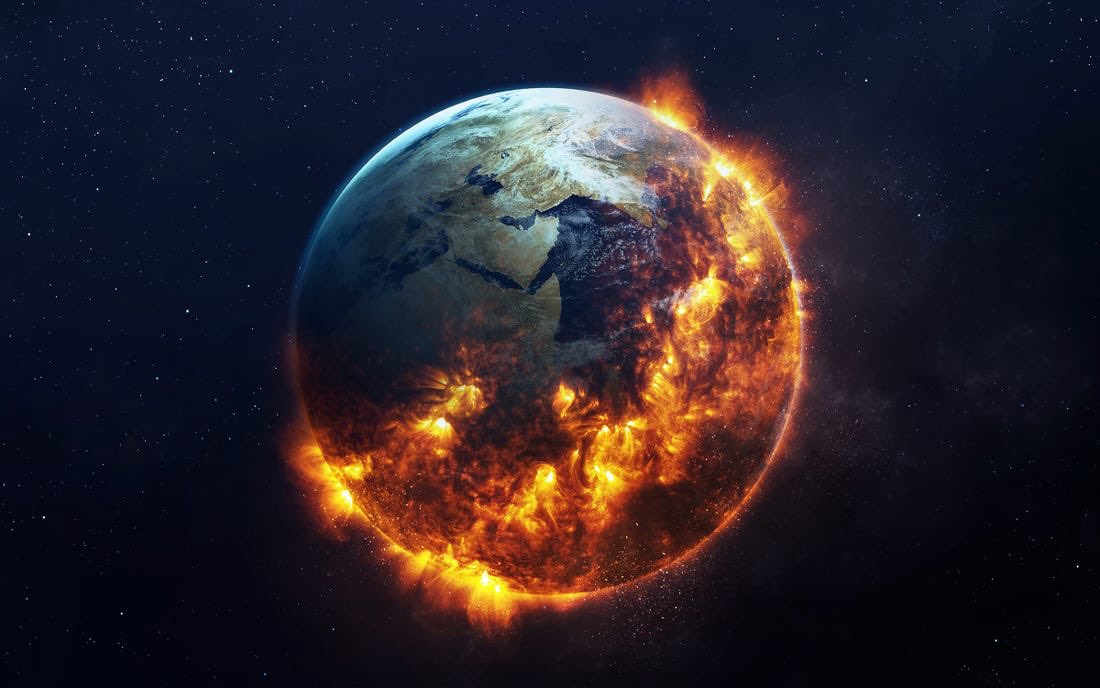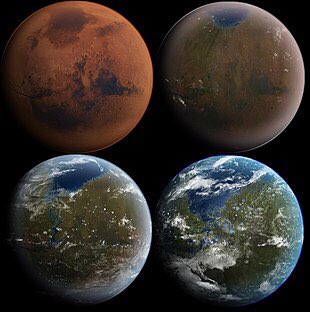At any second, there could be a global catastrophe that wipes out a large amount of the human population. It’s dark to think about, but it’s not unlikely. Currently, we are destroying our own planet through climate change, and eventually Earth could become inhospitable.
(2)
(2)
What do we do in instances like this? Surely, we want to continue living on for as long as possible, don’t we? The answer may lie within the realm of science fiction. Although “fiction” is becoming closer to “reality” than we may think.
(3)
(3)
We have all heard people talking about “Moon colonies” or “Mars colonies,” but how possible are these? Where will humanity go when Earth simply becomes... uninhabitable? Is it possible for us to leave our planet behind and start a new life elsewhere? How long will it take?
(4)
(4)
There are many questions that arise from the topic of space colonization. There have been arguments for and against the subject.
According to Wikipedia, these are the arguments in favor of space colonization:
1. The survival of human colonization and the biosphere in...
(5)
According to Wikipedia, these are the arguments in favor of space colonization:
1. The survival of human colonization and the biosphere in...
(5)
the event of a planetary-scale disaster (natural or man-made).
2. The availability of additional resources in space that could enable the expansion of human society.
However, there are also arguments against space colonization:
1. The colonization of the cosmos may be...
(6)
2. The availability of additional resources in space that could enable the expansion of human society.
However, there are also arguments against space colonization:
1. The colonization of the cosmos may be...
(6)
likely to enhance the interests of the powerful (major economic and military institutions).
2. Exacerbate already pre-existing detrimental processes such as wars, economic inequality, and environmental degradation.
(7)
2. Exacerbate already pre-existing detrimental processes such as wars, economic inequality, and environmental degradation.
(7)
But what exactly are the reasons for space colonization? Why would we want to leave Earth? What does the cosmos hold for us?
Human survival is the first reason that comes to mind.
Stephen Hawking argued that space colonization is a means of saving humanity.
(8)
Human survival is the first reason that comes to mind.
Stephen Hawking argued that space colonization is a means of saving humanity.
(8)
He predicted that humanity would go extinct in the next few thousand years unless space colonies were established. He stated that we face two options: long-term extinction or colonize space within the next couple hundred years.
His argument has validity to it, because we...
(9)
His argument has validity to it, because we...
(9)
as a species cannot survive on one planet alone, especially with the rate of growth of the human population. Earth simply cannot sustain us in the long-term, and this isn’t even considering any planetary-scale disasters.
Needless to say, human survival is a large factor...
(10)
Needless to say, human survival is a large factor...
(10)
in driving the interest for space colonization.
But why else should we consider this?
Well, space has a lot of resources that we could use. Whether it comes to materials or energy, there is no shortage of it in outer space. “The Solar System alone has, according to...
(11)
But why else should we consider this?
Well, space has a lot of resources that we could use. Whether it comes to materials or energy, there is no shortage of it in outer space. “The Solar System alone has, according to...
(11)
different estimates, enough material and energy to support anywhere from several thousand to over a billion times that of the current Earth-based population” (Wikipedia).
This could lead to the discussion of asteroid mining, which has been thought of as a means to save...”
(12)
This could lead to the discussion of asteroid mining, which has been thought of as a means to save...”
(12)
money on space exploration. If we were to use resources from outer space, we would not have to exhaust the limited resources we have left on Earth. Essentially, there is an endless amount of growth potential for the human population if we use extraterrestrial resources.
(13)
(13)
There are even other reasons for establishing space colonies, such as further expansion without consequences. This means that we would not have to worry about displacing any pre-existing populations or harming wildlife as we’ve done in the past.
Another reason would be...
(14)
Another reason would be...
(14)
alleviating overpopulation, which has been previously discussed.
But how could we perform such a task? It sounds like we need the technology and money to do so, and how much time would this even take?
This brings us to the topic of “Terraforming Mars.” It’s an...
(15)
But how could we perform such a task? It sounds like we need the technology and money to do so, and how much time would this even take?
This brings us to the topic of “Terraforming Mars.” It’s an...
(15)
interesting concept, but we would essentially have to create an Earth-like environment from scratch (including creating an atmosphere). A paper titled “The Terraforming Timeline” outlines a plan for how we can turn Mars into our new home.
Essentially, we would have to...
(16)
Essentially, we would have to...
(16)
warm the planet to a value close to Earth’s average surface temperature, and then we would have to produce sufficient levels of oxygen for us to be able to breathe. There would be two key terraforming steps; however, it would be very difficult for us to be able to produce...
(17)
(17)
such high levels of oxygen in such a short amount of time unless there is some sort of technological breakthrough.
However, before we can even begin to terraform the surface, we need to take “pre-terraforming” actions according to the authors Aaron Berliner and Chris McKay.
(18)
However, before we can even begin to terraform the surface, we need to take “pre-terraforming” actions according to the authors Aaron Berliner and Chris McKay.
(18)
We would have to investigate the Martian surface in order to determine the amount of water on the surface, the amount of carbon dioxide in the atmosphere (and in ice form in the poles), and the amount of nitrates in the Martian soil ( http://phys.org"> http://phys.org ).
(19)
(19)
How would we warm the surface? By deliberately putting a large amount of carbon dioxide in the atmosphere in order to induce a greenhouse effect. Sound familiar? This process is the “easier” part of terraforming.
Creating an oxygen-rich atmosphere would take anywhere...
(20)
Creating an oxygen-rich atmosphere would take anywhere...
(20)
from around 100,000 years to 170,000 years, due to the lack of efficiency of how Mars traps incident solar radiation. We would have to essentially simulate photosynthesis, which relies primarily on the Sun.
(21)
(21)
There are people that also argue against terraforming another planet, such as Valeriy Yakolev, an astrophysicist and hydrogeologist from The Laboratory of Water Quality in Kharkov, Ukraine.
He states that humans would experience very negative side effects from being...
(22)
He states that humans would experience very negative side effects from being...
(22)
in space for too long, such as bone loss and muscle degradation.
He argues in favor of the creation of artificial habitats in low Earth orbit that would rely on artificial gravity (like an O’Neill Cylinder). These would allow humans to grow accustomed to life in space.
(23)
He argues in favor of the creation of artificial habitats in low Earth orbit that would rely on artificial gravity (like an O’Neill Cylinder). These would allow humans to grow accustomed to life in space.
(23)
Obviously there are many arguments and questions that arise from the topic of space colonization. Let me know what you guys think about the subject!
Should humans colonize other planets or moons? https://abs.twimg.com/emoji/v2/... draggable="false" alt="🚀" title="Rakete" aria-label="Emoji: Rakete">
https://abs.twimg.com/emoji/v2/... draggable="false" alt="🚀" title="Rakete" aria-label="Emoji: Rakete">
Should humans colonize other planets or moons?
Also check out my blog post!
It is MUCH more detailed on the subject! https://abs.twimg.com/emoji/v2/... draggable="false" alt="🪐" title="Planet mit Ringen" aria-label="Emoji: Planet mit Ringen">
https://abs.twimg.com/emoji/v2/... draggable="false" alt="🪐" title="Planet mit Ringen" aria-label="Emoji: Planet mit Ringen"> https://abs.twimg.com/emoji/v2/... draggable="false" alt="💫" title="Symbol für Benommenheit" aria-label="Emoji: Symbol für Benommenheit"> https://jaz21693.wixsite.com/mysite/post/should-humans-colonize-other-planets">https://jaz21693.wixsite.com/mysite/po...
https://abs.twimg.com/emoji/v2/... draggable="false" alt="💫" title="Symbol für Benommenheit" aria-label="Emoji: Symbol für Benommenheit"> https://jaz21693.wixsite.com/mysite/post/should-humans-colonize-other-planets">https://jaz21693.wixsite.com/mysite/po...
It is MUCH more detailed on the subject!

 Read on Twitter
Read on Twitter






